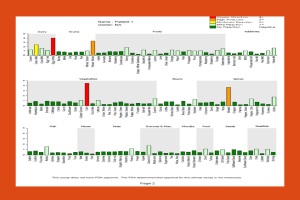I have compiled a very good article by Dr. Mercola on an important topic that I find important to optimizing your health. See reference links for complete articles.
Read below why vegetable oils or seed oil are high in Omega 6 and promote inflammation. Inflammation is a leading marker in most diseases. Help the body function better by eliminating and reducing these bad oils often added to so many packaged foods.
The key take-away is not so much to increase intake of foods high in Omega 3’s but to reduce foods high in omega 6 fatty acids. Avoiding seed oils is going to help. Lots of processed foods or packaged foods contain these oils. So what can you do? Eat more fresh foods in their whole form and avoid processed foods.
Info below from articles referenced:
Avoiding Processed Seed Oils Will Protect Your Health
Reference Link: https://articles.mercola.com/sites/articles/archive/2020/12/02/pufas-iron-intake-and-dpn.aspx
To protect your health, it is vital that you reduce your intake of industrially processed seed oils as much as you can. This means eliminating all of the following oils:
| Soy | Corn |
| Canola | Safflower |
| Sunflower | Peanut |
It’s very important to read the labels on the foods you buy!
The evidence continues to accumulate that avoiding toxic industrially processed seed oils, often referred to as “vegetable oils,” is essential to protecting your health, and recent research adds dietary iron to the increased health risks as well, particularly for those with Type 2 diabetes.1
Examples of seed oils high in omega-6 polyunsaturated fatty acids (PUFAs) include soybean, cottonseed, sunflower, rapeseed (canola), corn and safflower.2 Omega-6 is considered to be proinflammatory because of the most common variety, linoleic acid, which will radically increase oxidative free radicals and cause mitochondrial dysfunction.3
But all seed oils have linoleic acid, even “healthy” ones like avocado and olive oil, both of which have the majority of commercially available products adulterated with other seed oils that have even higher levels of linoleic acid. So, only purchase trusted and tested brands and once you have them put the oil in the fridge. The linoleic acid will remain liquid. Simply pour that oil in the trash and your olive or avocado oil will be healthier.
It’s also important to avoid nearly all processed foods and fast foods, as virtually all of them contain these toxic oils. The easiest way to do this is to prepare the majority of your food at home so you know what you are eating.
Study: “Three weeks on a high-PUFA diet causes heart failure in rats — three weeks.”
Shortened Story at-a-glance
- Researchers found a connection between the intake of iron and seed oils high in omega-6 polyunsaturated fatty acids (PUFAs) with diabetic peripheral neuropathy (DPN) in people with Type 2 diabetes
- Many chronic diseases appear to be the result of a catastrophic cascade of health declines triggered by the long-term consumption of omega-6 seed oils
- To protect your health, it is vital that you reduce your intake of industrially processed seed oils as much as you can, which includes virtually all processed foods and fast foods that contain them
Many chronic diseases appear to be the result of a catastrophic cascade of health declines triggered by the long-term consumption of seed oils (omega-6). For instance, Dr. Chris Knobbe, an ophthalmologist and the founder and president of the Cure AMD Foundation, a nonprofit dedicated to the prevention of age-related macular degeneration (AMD), believes age-related macular degeneration (AMD) should be called diet-related macular degeneration instead.
Knobbe explained the complex process in his presentation at the ALLDOCS annual 2020 meeting:11
“Here’s what excess omega-6 does in a westernized diet: induces nutrient deficiencies, causes a catastrophic lipid peroxidation cascade, is what this does … This damages … a phospholipid called cardio lipid in the mitochondrial membranes. And this leads to electron transport chain failure … which causes mitochondrial failure and dysfunction.
And this leads first to reactive oxygen species, which feeds back into this peroxidation cascade. So, you’re filling up your fat cells and your mitochondrial membranes with omega-6, and these are going to peroxidize because of the fact that they are polyunsaturated.
All right, next thing that happens, insulin resistance, which leads to metabolic syndrome, Type 2 diabetes, nonalcoholic fatty liver disease. When the mitochondria fail you get reduced fatty acid, beta oxidation, meaning you can’t burn these fats properly for fuel.
So now you’re … carb dependent and you’re heading for obesity. So, you’re feeling tired. You’re gaining weight. Your mitochondria are failing to burn fat for fuel … this is a powerful mechanism for obesity.
So, the energy failure at the cellular level leads to nuclear mitochondrial DNA mutations, and this leads to cancers. Three weeks on a high-PUFA diet causes heart failure in rats — three weeks. And this also leads to apoptosis and necrosis. And of course, that’s how you get disorders like AMD, Alzheimer’s.”
Are Seed Oils Behind the Majority of Diseases This Century?
Reference Link: https://articles.mercola.com/sites/articles/archive/2020/07/18/chris-knobbe-macular-degeneration.aspx
Shortened Story at-a-glance
- Ophthalmologist Dr. Chris Knobbe says most chronic diseases such as heart disease, cancer, high blood pressure, stroke, diabetes, obesity, metabolic syndrome, Alzheimer’s disease and macular degeneration are linked to the consumption of processed seed oils
- Polyunsaturated fatty acids, also called PUFAs, found in vegetable oils, edible oils, seed oils, trans fat and plant oils, owe their existence to “roller mill technology,” which replaced stone mill technology and removed their nutrients
- Many people now consume 80 grams of PUFAs a day, which amounts to 720 calories and one-third of their caloric intake









